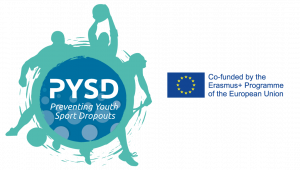DETAILED DATA BY COUNTRY
Context and objectives
The drop out phenomenon is a complex problem which depends on a multiplicity of social, psychological and economic causes. Within the PYSD project a deep scientific research has been conducted to investigate the reasons that produce or accelerate the manifestation of the phenomenon of sports dropout in adolescence.
The research is the result of an initial analysis of the best practices used to prevent dropout in the partner countries (Italy, Serbia, Bulgaria, Spain) and aims to understand which factors mainly influence the personal ability to face and adapt to different adversities in life, problems, sources of stress, etc. specifically in the sport field.. The priority is to investigate how to improve, in the next stage of the project, the “resilience” by acting on some specific elements that are common in the lives of the children, boosting a kind of “bouncing back” from life difficulties and problems towards preventing the dropout phenomenon.
The resilience is assumed to be one of the main factors that can reflect, inversely, the tendency of children to take the road of dropout. The personal motivation and also other local and individual aspects obviously affect the phenomenon, nevertheless the purpose of the overall project is to define a standard methodology by acting on cross-personal and cross-country elements.
Methodology and research areas
The research was conducted from September 2019 to January 2020. The study involved children and young people from 4 countries: Italy, Spain, Serbia and Bulgaria. In total 2404 questionnaires were collected. The study is based upon a scientific-based statistic sample in each country, although the final outcome of the project will be, as much as possible, unbound from the nationalities and instead extended to the European area – what is commonly called a standardized “best practice”. The research dimensions have been the following:
1) Questionnaire for collecting socio-demographic variables (ex: gender, age, place of living, dominant sport and how long practicing in sport, etc.), to identify the target of the survey;
2) The Students Resilience Scale – SRS (Lereya et al. (2016), which investigates young people resilience, through 10 indicators:
- Family connection
- School connection
- Community connection
- Participation in home and school life
- Participation in community life
- Self-esteem
- Empathy
- Problem solving
- Goals and aspirations
- Peer support
3) The Parent Involvement in Sport Questionnaire – PISQ (Lee & MacLean, 1997), which consists of 3 indicators:
- The Directive Behaviour scale (DB) – which assesses the extent to which parents control their children’s behavior in sport.
- The Praise and Understanding (PU) – which assesses the empathy of parents towards their children.
- The Active Involvement scale (AI) – which assesses parents’ activity in the club or during practice sessions.
4) The Coach-Athlete Relationship Questionnaire – CART-Q (Jowett & Ntoumanais, 2004), which consists of 3 indicators:
-
- Commitment – is defined as coaches’ and athletes’ intention to maintain their athletic relationship (cognitive aspect)
- Closeness – refers to feeling emotionally close with one another in the coach-athlete relationship (affective aspect)
- Complementarity – reflects coaches’ and athletes’ complementarity or cooperative interactions, especially during training (behavioral aspect).
Main results
The Students Resilience Scale – SRS
The Student Resilience Scale (SRS), measured on a scale from 1 to 5, is higher in children and youth in Serbia, especially for indicators related to Family and Community connection and to goals and aspirations. Spanish and Bulgarian children and youth have a slightly lower score, while Italian children show the lowest levels of resilience, mainly due to the low level of rate in active participation in home and school life.
This item is rated on five- point, from never (1) to always (5).
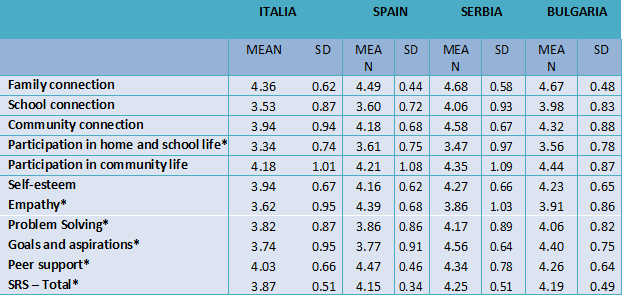
The Parent Involvement in Sport Questionnaire – PISQ
The assessment of the level of involvement of both parents in the sports activities of children and youth as measured by the PISQ questionnaire in the General Score (PISQ-total) is most pronounced in children and young people in Bulgaria, slightly lower in children and young people in Serbia, on average in children and young people in Spain, while it is least pronounced in children and young people in Italy. This item is rated on five- point, from never (1) to always (5).
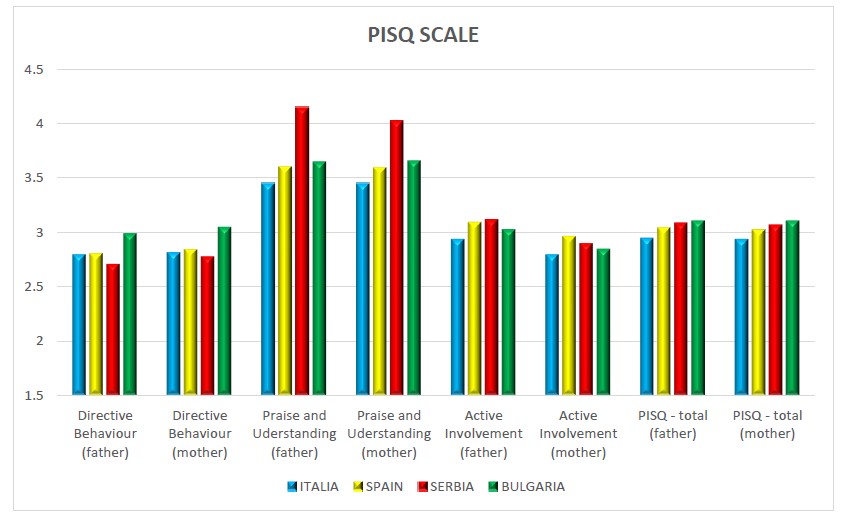
In the next steps of the project, it’s foreseen to widen to a cross-country analysis in order to identify the average impact and influence of the parents’ involvement and behaviors in the children’s tendency to be motivated (or not) in sport. Averagely, it’s possible to assume that a key factor, in all countries analyzed and thus foreseeable in the European context, is the ability of both parents to talk and understand the children’s’ needs which, when present, can be really effective in the prevention of sport dropout.
The Coach-Athlete Relationship Questionnaire – CART-Q,
An other important factor potentially able to guide children’s resilience against the dropout. is the Coach-Athlete Relationship. This relationship is measured in terms of commitment, closeness and complementarity. Items are rated on seven-point, from I don’t agree at all (1) to extremely I agree (7).

“ Closeness” , which reminds to the affective aspect of the athlete-coach relationship, seems to be the most relevant variable in all the countries, whilst, on the contrary the “commitment of the athletes to the coaches, is not so relevant and could not be highly determinant in the sport dropout phenomenon.
Relation of Resilience Levels (SRS) with achievement on PISQ and CART-Q by country
The following tables show the connection between the overall achievement on the resilience scale measured by the SRS scale, on the one hand, and the parental involvement and relationships with the coach measured by the PISQ and CART-Q scales, on the other hand. Here the results for each partner country.
Italy
– In Italy children and young people describing themselves as more resilience are those who:
– have a cooperative relationship with the coach during training (Complementarity),
– describe the relationship with their father as actively including (Active Involvement of father),
– perceive the relationship with the mother as supportive and understanding (Praise and Understanding of mother).
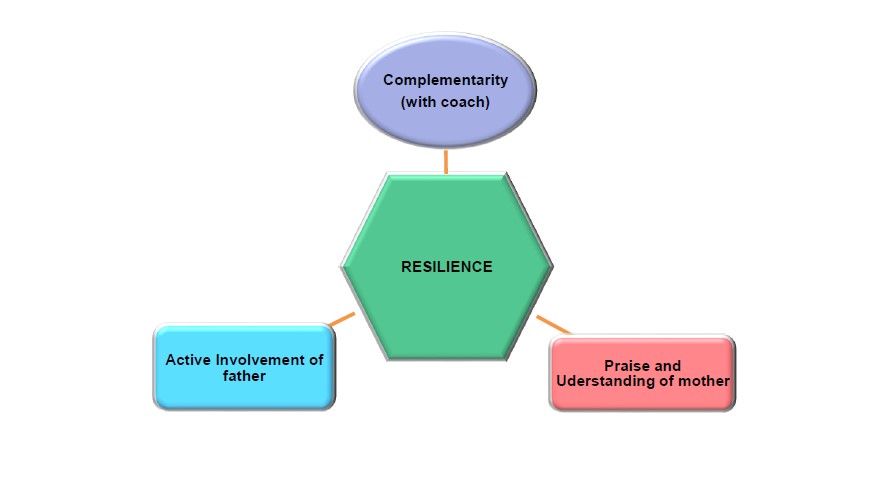
Spain
The same exercise in Spain shows that the most resilient young people are those who see the relationship with coaches characterized by closeness (Closeness) and then commitment (Commitment). They perceive their mother (but not the father) able to support and understand (Praise and Understanding of mother) while the father’s attitude seems to be more directive.
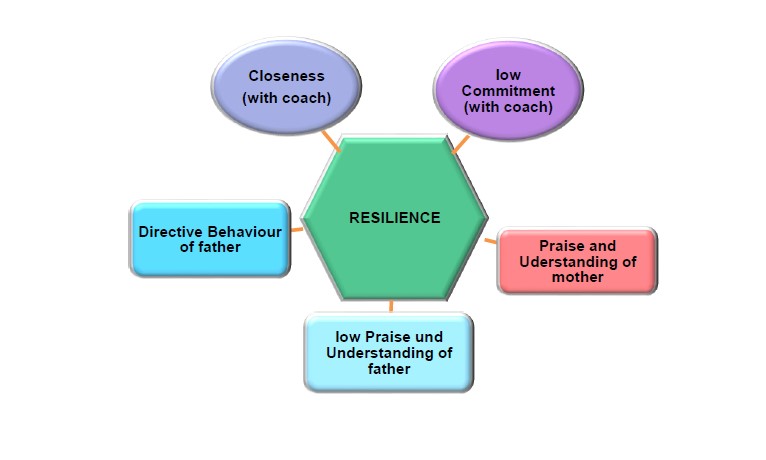
Serbia
In Serbia the most important and valuable variables are:
- an active Involvement of father,
- a more directive and stronger behavior of mother than fathers but at the same time a low Active Involvement of
- A good complementarity and closeness in relation to the coach.

Bulgaria
Young people from Bulgaria view the cooperative relationship during training (Complementarity), describe the relationship with the father as actively including (Active Involvementof father), without direct behavior (low Directive Behavior of father), while at the same time describing the relationship with the mother as more directive (Directive Behavior of mother).
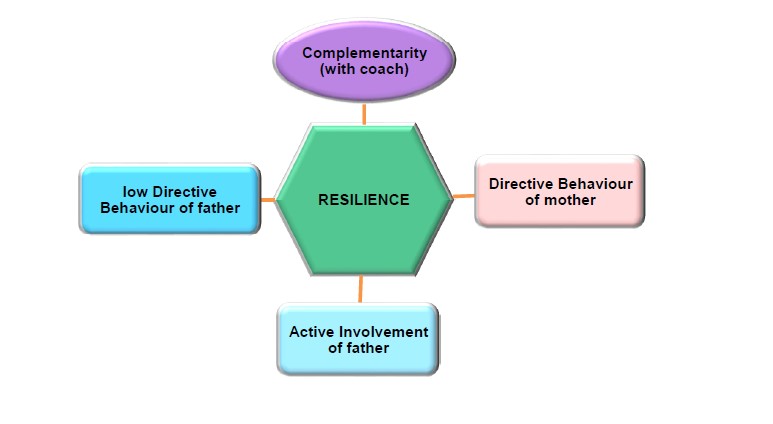
Next steps
Starting from these results the next steps of the project will consists of:
- Extending the analysis carried out for each partner country at the level of the partnership area in order to obtain input for an overall European analysis;
- Identifying a set of concrete actions to improve the level of resilience of young people in each of the dimensions analyzed in the research;
- Testing the actions on a sample of young people in the different partner countries;
- Analyzing the results of the test in order to share educational patterns in which children, parents, coaches and sports clubs can dialogue and take an active part in order to optimize the choice of instruments and objectives.
References
Jowett, S & Ntoumanis, N (2004). The Coach-Athlete Relationship Questionnarie (CART-Q): development and initial validation. Scandinavian Journal of Medicine & Science in Sports, 14(4):245-57.
Lee, M & MacLean, S (1997). Sources of Parental Pressure Among Age Group Swimmers. Europian Journal of Physical Education, 2:2, 167-177.
Lereya et al. (2016). The student resilience survey: psychometric validation and associations with mental health. Child Adolesc Psychiatry Ment Health, 10:44.
